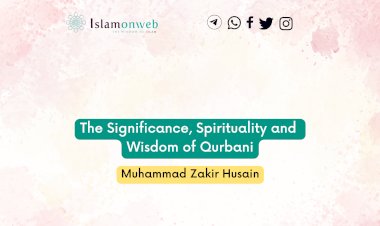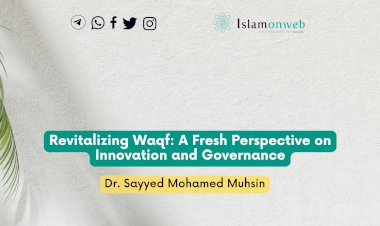Sharīʿah: Divine Paradigm for Comprehensive Excellence
Over the past few decades, Sharīʿah has been a frequent topic for serious discussions in academia as well as public discourse. It is, on the other side, being used among the most misunderstood and misinterpreted terms as a result of outpouring stereotypes. It is often attributed to violence, domination, gruesome punishments, and inequality. A good number of people from both proponents and opponents of “Sharīʿah models” seem to have no clue of what Sharīʿah exactly is, what does it aim at, and what it is espoused or opposed.
In general, though Sharīʿah has been translated as ‘Islamic law’ or ‘revealed law’, its scope and realm are much wider than the perspectives of modern law and legal system. Sharīʿah deals with not only a person’s relation with the people he interacts with and the state he lives in, but also with God, nature, inner and outer worlds, and even with his conscience. Likewise, Sharīʿah does not separate morality from its parameter, rather it gives due consideration for both ethical standards and legal rules.
Being the divine paradigm for comprehensive excellence, Sharīʿah renders the complete code of living that is conducive to the success of both worlds. The concise tip to achieve Sharīʿah's objectives can be articulated that it is unconditional submission to God, i.e. the personification of islām (submission), īmān (faith) and iḥsān (excellence and doing what is beautiful) in a person's life. Sharīʿah exemplifies a model of life which is configured with wisdom, knowledge, and mercy since it is from All-wise (al-Ḥakīm), All-Knowledgeable (al-ʿAlīm) and the Most Merciful (al-Raḥmān).
Sharīʿah endorses legal rules and restrictions on both domains of worship (ʿibādāt) and civil transactions (muʿāmalāt) not for the sheer sake of submission via engaging with definite wordings and rituals, rather they are aimed at materializing certain higher objectives in human life. These objectives are widely known as maqāṣid al-sharīʿah. To facilitate the process of achieving these objectives, Sharīʿah puts forth certain maxims which are known as al-qawāʿid al-fiqhiyyah (Islamic legal maxims).
Ibn al-Qayyim al-Jawziyyah (d. 1350), a prolific Ḥanbalī jurist and theologian, gives hints to its major leitmotifs in the following sentence. “Sharīʿah is based on wisdom and achieving people’s welfare in this life and the afterlife. Sharīʿah is all about justice, mercy, wisdom, and good. Thus, any ruling that replaces justice with injustice, mercy with its opposite, welfare with mischief, or wisdom with nonsense, is a ruling that does not belong to the Sharīʿah, even if it is claimed to be so according to some interpretation” (Iʿlām al-Muwaqqiʿīn, 1973: 3: 3).
Abū Ḥāmid al-Ghazālī (d. 1111), influential Ashari theologian, jurist, and mystic, explained the objectives of Sharīʿah, “it is for the protection of five matters, namely the faith, life, intellect, posterity and wealth (Al-Ghazālī, 1413AH: 1: 174). All actions aimed at the preservation of these five matters are considered as ‘benefit’ (maṣlaḥah) whereas whatever causes their damage is ‘evil’ (mafsadah), so elimination of what is evil is also deemed as 'benefit'." The overarching principle underlies that the Sharīʿah can be said as 'attainment of the welfare of people and elimination of evils' (jalb al-maṣlaḥah wa dar’ al-mafsadah) (al-Qarḍāwī, 2000: 1: 31).
Maqāṣid al-sharīʿah is explained as the philosophy of Islamic law. It aphoristically subsumes key themes of the Sharīʿah, therefore it can be utilized in legal and ethical interpretations, decision-making and deduction of rulings on unprecedented topics.
Al-Qarāfī (d. 1285), Mālikī jurist and legal theoretician, pointed out that the science of Islamic legal maxims is an essential genre of Islamic legal theory which demonstrates a jurist’s competence and showcases the splendour of fiqh; but above all, it enables a jurist to comprehend the variety and methods of legal interpretation (Anwār al-Burūq: 1: 3). By employing the methods of intensive and extensive induction of the particular cases of various fiqh chapters, jurists frame the legal maxims in the form of inclusive tactics and universal values that are crucial in rationalizing the stand of Islamic law on any given scenario (Al-Suyūṭī, 1983: 6).
When legal maxims are used to pass legal judgements on ethico-legal issues, they reflect ethical values ingrained in the legislative system of Islam (Elgariani, 2012: 100). Furthermore, these axioms are fashioned, in succinct wordings and concise themes, which unveil overall predispositions and preferences of the Sharīʿah in the engagement with events and exigencies, and manifest various aspects of interpersonal relationships, the relationship with self, fellow human beings, and other creatures and most importantly with the Creator. Considering that the ultimate goal of the Sharīʿah is to obtain benefits and ward off injuries, the legal maxims are meant to facilitate such process (al-Zarqā, 1998: 2:297).
The major role played by fiqh in any society was and has been fashioning a system that helps create a social order embedded with law and rectitude. It infuses legal norms mediating with culture and customs and serving the imperatives of harmony and righteousness. The Uṣūlī principles namely maṣlaḥah mursalah (unrestricted public interest) and ʿādah (custom) primarily do the duty of protecting the public interest whereas istiḥsān (juristic preference), sadd dharā’iʿ (blocking the means) are employed for eliminating the potential harms in society. These principles are enough to prove that Sharīʿah is not meant to meet the needs of a time and place it was revealed to; rather it renders a system, mechanism, and process that are competent to operate all the time and place effectively and efficiently.
This section named "Sharīʿah" is meant to deliberate and explore various perspectives of the abovementioned themes. It will focus on exploring the wisdom, pertinence, and scope of Sharīʿah in addressing the contemporary issues, analyzing its role and relevance not only in personal or ritual life but also in familial, social, educational, financial and medical. Likewise, it will seek to enrich discourses on maqāṣid al-sharīʿah and al-qawāʿid al-fiqhiyyah, particularly their application to various contemporary issues. Rather than revelling in nit-picking, it will attempt to address the jurisprudential issues from a broader perspective but within the guidelines of four approved schools of Islamic jurisprudence (madhāhib).
References
Ibn al-Qayyim al-Jawziyyah, Shams al-DĪn. (1973). Iʿlām al-Muwaqqiʿīn ʿan Rabb al-ʿĀlamīn, ed. Taha Abd al-Ra’ūf . Beirut: Dār al-Jīl.
Al-Ghazālī, Abū Ḥāmid. (1413H). al-Mustaṣfā fī ʿIlm al-Uṣūl. Bayrūt: Dār al-Kutub al-Ilmiyyah.
Al-Qarḍāwi, Yūsuf. (2000). Fiqh al-Zakāt. (Beirut: Mu’assat al-Risālah).
Al-Qarāfī, Shihāb al-Dīn. (n.d). Anwār al-Burūq fī Anwā’ al-Furūq. Muḥammad Rawās Qalʿajī (Ed.). Beirut: Dār al-Maʿrifah.
Suyūṭī, Jalāl al-Dīn. (1983). Al-Ashbāh wal-Naẓā’ir. Beirut: Dār al-Kutub al-ʿIlmiyyah.
Elgariani, Fawzy Shaban. (2012). Al- Qawā’id al-Fiqhiyyah (Islamic Legal Maxims): Concept, Functions, History, Classifications and Application to Contemporary Medical Issues. Unpublished Doctoral dissertation, University of Exeter, UK.
Al-Zarqā, Mustafa Ahmad. (1983). Al-Madkhal al-Fiqhī al-ʿᾹmm (7th edn). Damascus: Matbaʿah Jamiʿah.
(Dr. Sayyed Mohamed Muhsin is an Assistant Professor in Kulliyah of Islamic Revealed Knowledge and Human Sciences, International Islamic University Malaysia)
Disclaimer
The views expressed in this article are the author’s own and do not necessarily mirror Islamonweb’s editorial stance.
146 Comments
-

-

The article discusses Sharīʿah as a divine system aiming for comprehensive excellence, integrating spiritual, moral, and social dimensions. It emphasizes Sharīʿah’s focus on justice, human dignity, and societal welfare, aligning individual and collective responsibilities with divine guidance.
-

-

This article talks about the meaning and objectives of Sharia, and what it means to us when it comes to our ethical conducts and legal rulings. As we know, our common moral principles constantly changing throughout the generations. For example, young marraige used to be common a devade ago while it is not anymore. Morality based on human desire never stays the same and because of that we, human need restriction, guidance set up by our Lord. And that is the Sharia. Although, people struggle to follow all the Islamic rulings, the world will definetly become better when All Muslims try their best to follow it.
-

Wise muslim
1 year ago
Yes Maryam, your insight about Sharia as a divine anchor in shifting moral landscapes is compelling. Human values, like views on early marriage, evolve, but Sharia’s timeless principles (justice, mercy, dignity) transcend time and culture. Its strength lies in balancing fixed ideals (Maqasid al-Sharia) with adaptive ijtihad, ensuring relevance without compromising core ethics.
-
-

From what I gathered from the article, the masses hold preconceived notions about the true definition of Shariah. The article addresses this stigma by elaborating on the intricate concepts within Shariah, emphasizing the intrapersonal relationship one has with oneself rather than a projection of violence.
























Leave A Comment